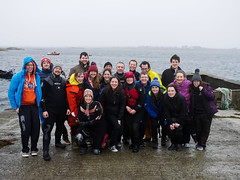This page outlines the personal diving equipment you’ll need for open water diving with the club.
Basic snorkelling gear
Snorkelling just needs get a mask, fins, snorkel and boots. The club has fins and masks for borrowing, though it’s handy to get your own, and you’ll likely get a package deal that will include fins, mask and snorkel. You’ll use this kit when you start open water diving too.
- Mask
- Lenses must be ‘tempered’ glass (look for a ‘T’ symbol on the glass)
- Prescription lenses can be fitted if you need glasses and don’t wear contact lenses
- ‘Skirt’ surrounding lenses should be made of silicone rubber
- Colourless silicone lets in more light than e.g. black silicone
- To check the fit, place the mask on your face and inhale through your nose. The mask should stay in place and be hard to pull away
- Avoid too-large volume masks – the lenses should be quite close to the face
- Before first use, de-grease the glass and ‘skirt’ by rubbing thoroughly with toothpaste, or the mask will fog up underwater
- Fins
- It’s best to buy fins you can use in the sea, not just the pool.
These have a foot pocket for neoprene / drysuit boots, and a heel strap
- It’s best to buy fins you can use in the sea, not just the pool.
- Snorkel
- The cheapest are just a plastic tube with a mouthpiece – they will get you by
- More expensive ones have valves to make draining easier, and prevent rebreathing exhaled air
- Boots
- For ‘semi-dry’ wetsuit diving, you need neoprene boots, which fit inside fins. If you’re buying fins, check the boots fit comfortably.
The dive shops in Dublin usually offer package deals on pool gear around October. Flagship Scuba in Grand Canal Basin at the east end of Pearse Street, and Great Outdoors on Clarendon Street, near the Stephen’s Green Centre, are both near to Trinity. Check with the Diving or Training Officers who should have the details of any deals.
[N.B. – All other equipment needed for pool sessions (cylinders, regulators, stab jackets, weights) is provided by the club.]
Semi-dry suits
For diving in the sea, you’ll need a suit. Most people go for a semi-dry suit to start with. These are close-fitting neoprene suits with wrist, neck and ankle seals. They trap a layer of water between suit and skin, and this warms up, stopping you from getting cold. Semi-dry suits must fit well or water will flush through and you’ll lose heat very quickly.
For Irish waters, most people use a 2-piece 6mm or 7mm-thick suit. At current (2010) prices, these are around €300 new. However, the club now has a good number of semi-dry suits for borrowing, and also arranges a bulk discount deal around January. In addition, second-hand semi-dry suits often come up for sale within the club.
Dry-suits
An alternative to a semi-dry is a dry-suit. These keep the water out, and are worn with insulating underclothes and a neoprene hood. Dry-suit diving requires you to control suit buoyancy as well as BCD buoyancy, so it’s probably a little easier to learn to dive in a semi-dry. However, dry-suits are more comfortable and usually warmer – particularly between dives. Most people who continue diving in the club buy a dry-suit.
Dry-suits cost from €500 to €1500 or more new, though second-hand suits do come up for sale in the club. They can be off-the-peg or made to measure, come in a range of materials, and have many options for valves, zips, wrist and neck seals etc. If you’re thinking of buying one, it’s worth asking around the club to see what people recommend.
Gloves
You’ll also need gloves (at least until the water warms up towards summer). These are usually made of 5mm or 3mm neoprene. With 5mm gloves on, it can be difficult to use your fingers. 3mm gloves are much more flexible, though less warm. Mitten-style gloves are warmer, though again make you less dexterous than do gloves with separate fingers.
Weight belts
Suited up and in salt water, you’ll need weight to sink. Most people buy a simple weight belt made from webbing, lead weights and a buckle. Weights are secured by threading on retainers, or by twisting the webbing.
You can also buy weight belts containing lead shot. These are more comfortable, though less adjustable and more expensive. People buying their own BCD sometimes opt for one with integrated weights.
Other gear
As you progress through the diving grades, you’ll need to acquire some more items of equipment. Here’s a list of things that most Sports Divers would have:
- Depth gauge and timer, or dive computer
- Knife or cutters
- Delayed SMB (surface marker buoy) and reel
- Compass
- Torch
Eventually, most people who keep on diving buy their own regulators, BCDs and cylinders (or rebreathers).




